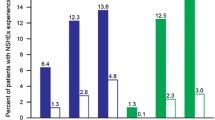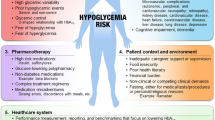Abstract
Aims
To assess the independent role of severe hypoglycemia on 7-year cumulative incidence of prolonged QTc in a large cohort of patients with type 1 diabetes.
Methods
People with type 1 diabetes recruited by the EURODIAB Prospective Complications Study who had normal QTc were examined at baseline and after 7 years with standardized methods (n = 1415; mean age ± SD 32.1 ± 9.6 years; diabetes duration 14.2 ± 8.8 years). Hypoglycemic episodes were assessed by a questionnaire. QTc was calculated according to Bazett’s formula. In logistic regression analysis, we examined the role of severe hypoglycemia (none, 1–2, or 3 and more episodes/year) on the cumulative incidence of prolonged QTc, independently of age, sex, HbA1c, blood pressure, BMI, physical activity, distal symmetrical and autonomic neuropathy.
Results
In total, 264/1415 (17%) patients had incident prolonged QTc. Compared to those with persistently normal QTc, a greater proportion of incident cases had 3 and more hypoglycemic episodes at baseline (16.3 vs 11.2%, p = 0.03) and after 7 years (15.2 vs 9.6%, p = 0.01). In logistic regression analysis, 3 or more episodes of severe hypoglycemia at baseline did not increase cumulative incidence of prolonged QTc (OR 1.34, 95% CI 0.88–2.03). By contrast, severe hypoglycemia at the follow-up examination was associated with higher incidence of QTc prolongation (OR 1.68, 1.09–2.58), which reverted to not significant after adjustment for diabetic neuropathy.
Conclusions
Severe hypoglycemia was not associated with incidence QTc prolongation in type 1 diabetic patients from the EURODIAB PCS.
Similar content being viewed by others
Abbreviations
- CVD:
-
Cardiovascular diseases
- CHD:
-
Coronary heart disease
- BMI:
-
Body mass index
- OR:
-
Odds ratio
References
Rossing P, Breum L, Major-Pedersen A et al (2001) Prolonged QTc interval predicts mortality in patients with type 1 diabetes mellitus. Diabet Med 18:199–205
Lu Z, Jiang YP, Wu CYC et al (2013) Increased persistent sodium current due to decreased PI3K signaling contributes to QT prolongation in the diabetic heart. Diabetes 62:4257–4265
Robinson RT, Harris ND, Ireland RH, Macdonald IA, Heller SR (2004) Changes in cardiac repolarization during clinical episodes of nocturnal hypoglycaemia in adults with type 1 diabetes. Diabetologia 47:312–315
Murphy NP, Ford-Adams ME, Ong KK et al (2004) Prolonged cardiac repolarization during spontaneous nocturnal hypoglycaemia in children and adolescents with type 1 diabetes. Diabetologia 47:1940–1947
Kubiak T, Wittig A, Koll C et al (2010) Continuous glucose monitoring reveals associations of glucose levels with QT interval length. Diabetes Technol Ther 12:283–286
Christensen TF, Cichosz SL, Tarnow L et al (2014) Hypoglycaemia and QT interval prolongation in type 1 diabetes—bridging the gap between clamp studies and spontaneous episodes. J Diabetes Complicat 28:723–728
Gruden G, Giunti S, Barutta F et al (2012) QTc interval prolongation is independently associated with severe hypoglycemic attacks in type 1 diabetes from the EURODIAB IDDM complications study. Diabetes Care 35:125–127
Cha SA, Yun JS, Lim TS et al (2016) Baseline-corrected QT (QTc) interval is associated with prolongation of QTc during severe hypoglycemia in patients with type 2 diabetes mellitus. Diabetes Metab J 40:463–472
Fagher K, Löndahl M (2013) The impact of metabolic control and QTc prolongation on all-cause mortality in patients with type 2 diabetes and foot ulcers. Diabetologia 56:1140–1147
Giunti S, Bruno G, Lillaz E et al (2007) Incidence and risk factors of prolonged QTc interval in type 1 diabetes: the EURODIAB Prospective Complications Study. Diabetes Care 30:2057–2063
Stephenson JM, Kempler P, Perin PC, Fuller JH (1996) Is autonomic neuropathy a risk factor for severe hypoglycaemia? The EURODIAB IDDM Complications Study. Diabetologia 39:1372–1376
Gruden G, Barutta F, Chaturvedi N et al (2012) Severe hypoglycaemia and cardiovascular disease incidence in type 1 diabetes. The EURODIAB Prospective Complications Study. Diabetes Care 35:1598–1604
Vrtovec B, Delgado R, Zewail A, Thomas CD, Richartz BM, Radovancevic B (2003) Prolonged QTc interval and high B-type natriuretic peptide levels together predict mortality in patients with advanced heart failure. Circulation 107:1764–1769
Tesfaye S, Chaturvedi N, Eaton SE et al (2005) EURODIAB Prospective Complications Study Group. Vascular risk factors and diabetic neuropathy. N Engl J Med 352:341–350
Karavanaki K, Kazianis G, Kakleas K, Konstantopoulos I, Karayianni C (2007) QT interval prolongation in association with impaired circadian variation of blood pressure and heart rate in adolescents with type 1 diabetes. Diabet Med 24:1247–1253
Veglio M, Borra M, Stevens LK, Fuller JH, Cavallo Perin P (1999) The relation between QTc interval prolongation and diabetic complications. The EURODIAB IDDM Complication Study Group. Diabetologia 42:68–75
Lee SP, Yeoh L, Harris ND et al (2004) Influence of autonomic neuropathy on QTc interval lengthening during hypoglycemia in type 1 diabetes. Diabetes 53:1535–1542
Christensen TF, Tarnow L, Randløv J et al (2010) QT interval prolongation during spontaneous episodes of hypoglycaemia in type 1 diabetes: the impact of heart rate correction. Diabetologia 53:2036–2204
Reno CM, Daphna-Iken D, Chen YS, VanderWeele J, Jethi K, Fisher SJ (2013) Severe hypoglycemia-induced lethal cardiac arrhythmias are mediated by sympathoadrenal activation. Diabetes 62:3570–3581
Gill GV, Woodward A, Casson IF, Weston PJ (2009) Cardiac arrhythmia and nocturnal hypoglycaemia in type 1 diabetes—the ‘dead in bed’ syndrome revisited. Diabetologia 52:42–45
Veglio M, Chinaglia A, Cavallo-Perin P (2004) QT interval, cardiovascular risk factors and risk of death in diabetes. J Endocrinol Invest 27:175–181
Veglio M, Sivieri R, Chinaglia A, Scaglione L, Cavallo-Perin P (2000) QT interval prolongation and mortality in type 1 diabetic patients: a 5-year cohort prospective study. Neuropathy Study Group of the Italian Society of the Study of Diabetes, Piemonte Affiliate. Diabetes Care 23:1381–1383
Author information
Authors and Affiliations
Contributions
CA and GB contributed to the study concept and design, researched and interpreted the data, and drafted the manuscript. SG, PF, DF, SS, JF, NC, FB, GG researched data and reviewed the manuscript. GG and GB oversaw the progress of the project, contributed to the discussion, and reviewed the manuscript. GB is the guarantors of this work and, as such, had full access to all the data analysis and take responsibility for the integrity of the data and the accuracy of the data.
Corresponding author
Ethics declarations
Conflict of interest
The authors declare that they have no conflict of interest.
Ethics approval
The study was approved by local ethics committees
Human and animal rights
All procedures followed were in accordance with the ethical standards of the responsible committee on human experimentation (institution and national) and ith the Helsinki Declaration of 1975, as revised in 2008.
Informed consent
Informed consent was obtained from all subjects.
Availability of data and materials
The datasets used and/or analyzed during the current study are available from the corresponding author on reasonable request.
Additional information
Managed by Antonio Secchi.
Rights and permissions
About this article
Cite this article
Amione, C., Giunti, S., Fornengo, P. et al. Incidence of prolonged QTc and severe hypoglycemia in type 1 diabetes: the EURODIAB Prospective Complications Study. Acta Diabetol 54, 871–876 (2017). https://doi.org/10.1007/s00592-017-1018-6
Received:
Accepted:
Published:
Issue Date:
DOI: https://doi.org/10.1007/s00592-017-1018-6




